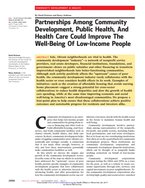0
Publication
Community:
Apr 4, 2019
The nation has large, pressing infrastructure needs, which are often felt most acutely in low-income communities due to decades of policy choices and lack of public and private investment. As federal lawmakers consider investing in infrastructure, a core priority should be to direct substantial resources across a range of areas to low-income communities, which could expand their access to safe living conditions and economic opportunity.
Authored by: Chye-Ching Huang and Roderick Taylor for the Center on Budget and Policy Priorities
Topics: Education, Funding, Health, Housing, Legislation & Policy, Low-income, Safety, Transportation
 Shared by Housing Is
Shared by Housing Is
Housing Is posted a
on Apr 4, 2019
Chye-Ching Huang and Roderick Taylor for the Center on Budget and Policy Priorities
The nation has large, pressing infrastructure needs, which are often felt most acutely in low-income communities due to decades of policy choices and lack of public and private investment.
0
News Article
Community:
Mar 11, 2019
The Trump administration released its budget proposal today for fiscal year 2020, and like its previous budget requests for 2017, 2018, and 2019, the administration is proposing steep cuts to both the Department of Housing and Urban Development (HUD) and the Department of Transportation (DoT).
Authored by: Jeff Andrews for Curbed
Topics: Funding, Homelessness, Housing, Legislation & Policy, Transportation
 Shared by Mica O'Brien
Shared by Mica O'Brien
Mica O'Brien posted a
on Mar 14, 2019
The Trump administration released its budget proposal today for fiscal year 2020, and like its previous budget requests for 2017, 2018, and 2019, the administration is proposing steep cuts to both the Department of Housing and Urban Development (HUD) and the Department of Transportation (DoT).
0
Podcast
Community:
Feb 26, 2019
Many are wondering how engaged President Trump actually is on one of his campaign issues: revitalizing the nation’s crumbling infrastructure. Eyes are turning back to Congress for a broad infrastructure package. Yet there is an even bigger issue of the looming insolvency of the Highway Trust Fund. BPC’s Jake Varn is joined by former Reps. Bill Shuster (R-PA) and Joe Crowley(D-NY) to discuss these issues.
Authored by: Bipartisan Policy Center
Topics: Community development, Funding, Housing, Legislation & Policy, Transportation
 Shared by Mica O'Brien
Shared by Mica O'Brien
Mica O'Brien posted a
on Mar 12, 2019
Many are wondering how engaged President Trump actually is on one of his campaign issues: revitalizing the nation’s crumbling infrastructure. Eyes are turning back to Congress for a broad infrastructure package. Yet there is an even bigger issue of the looming insolvency of the Highway Trust Fund.
0
News Article
Community:
Jan 30, 2019
The gas tax hasn’t budged since 1992, and highway trust fund is running on fumes. Could a Green New Deal pushed by Congress be a fix?
Authored by: Laura Bliss for CityLab
Topics: Community development, Funding, Housing, Legislation & Policy, Transportation
 Shared by Mica O'Brien
Shared by Mica O'Brien
Mica O'Brien posted a
on Feb 28, 2019
The gas tax hasn’t budged since 1992, and highway trust fund is running on fumes. Could a Green New Deal pushed by Congress be a fix?
0
Publication
Community:
Feb 19, 2019
So, are the stars better aligned for an infrastructure bill this year? Unfortunately, rhetoric only goes so far, and Washington continues to suffer from the same elemental failure as it did in 2017—the U.S. lacks a clear infrastructure vision. Only when Congress is ready to truly debate what objectives the federal government hopes to achieve—and how to invest to advance those goals—can we begin to craft a transformative national strategy.
Authored by: Adie Tomer and Joseph Kane for The Brookings Institution
Topics: Community development, Funding, Housing, Legislation & Policy, Transportation
 Shared by Housing Is
Shared by Housing Is
Housing Is posted a
on Feb 28, 2019
Adie Tomer and Joseph Kane for The Brookings Institution
So, are the stars better aligned for an infrastructure bill this year? Unfortunately, rhetoric only goes so far, and Washington continues to suffer from the same elemental failure as it did in 2017—the U.S. lacks a clear infrastructure vision.
0
News Article
Community:
Jan 25, 2019
A whole host of factors — such as friends, housing and transportation — affect a person’s health and how much they need the social safety net. It’s time the government’s big health insurance programs took this reality into account, some lawmakers and policymakers are starting to argue.
Authored by: Paige Winfield Cunningham for The Washington Post
Topics: Asset building, Cost effectiveness, Disabilities, Education, Food insecurity, Funding, Health, Homelessness, Housing, Legislation & Policy, Low-income, Medicaid / Medicare, Seniors, Transportation, Workforce development
 Shared by Housing Is
Shared by Housing Is
Housing Is posted a
on Jan 25, 2019
Paige Winfield Cunningham for The Washington Post
A whole host of factors — such as friends, housing and transportation — affect a person’s health and how much they need the social safety net. It’s time the government’s big health insurance programs took this reality into account, some lawmakers and policymakers are starting to argue.
0
News Article
Community:
Nov 30, 2018
The city and county of Durham, GoTriangle and the Durham Housing Authority are committed to enhancing opportunities for existing low-income families as well as to increasing the production of affordable housing. The light-rail project is critical to the success of these goals, and the success of these goals is critical to the light-rail project.
Authored by: Anthony Scott and John Tallmadge for The Herald Sun
Topics: Community development, Funding, Housing, Legislation & Policy, Low-income, Partnerships, South, Stability, Transportation
 Shared by Mica O'Brien
Shared by Mica O'Brien
Mica O'Brien posted a
on Dec 3, 2018
Anthony Scott and John Tallmadge for The Herald Sun
The city and county of Durham, GoTriangle and the Durham Housing Authority are committed to enhancing opportunities for existing low-income families as well as to increasing the production of affordable housing.
0
Publication
Community:
Jul 24, 2018
The community development “industry”—a network of nonprofit service providers, real estate developers, financial institutions, foundations, and government—draws on public subsidies and other financing to transform impoverished neighborhoods into better-functioning communities. Although such activity positively affects the “upstream” causes of poor health, the community development industry rarely collaborates with the health sector or even considers health effects in its work. We propose a four-point plan to help ensure that existing and future collaborations achieve positive outcomes and sustainable progress for residents and investors alike.
Authored by:
Topics: Community development, Food insecurity, Funding, Health, Low-income, Partnerships, Supportive housing, Transportation
 Shared by Housing Is
Shared by Housing Is
Housing Is posted a
on Jul 24, 2018
The community development “industry”—a network of nonprofit service providers, real estate developers, financial institutions, foundations, and government—draws on public subsidies and other financing to transform impoverished neighborhoods into better-functioning communities.
 Shared by Housing Is
on Apr 4, 2019
Shared by Housing Is
on Apr 4, 2019


 Shared by Housing Is
on Feb 28, 2019
Shared by Housing Is
on Feb 28, 2019
 Shared by Housing Is
on Jan 25, 2019
Shared by Housing Is
on Jan 25, 2019
 Shared by Housing Is
on Jul 24, 2018
Shared by Housing Is
on Jul 24, 2018




